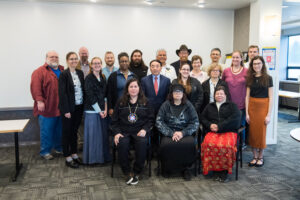The University of Michigan’s NAGPRA Office is situated within the Office of the Vice President for Research (OVPR). As such, the Office of the Vice President for Research supports relationship building and ongoing collaboration with Native Nation partners to fully comply with the requirements of Federal law.
The Native American Graves Protection and Repatriation Act (NAGPRA), as passed in 1990, required museums and other institutions that receive federal funding to follow a process developed for transferring culturally affiliated human remains and associated funerary objects, unassociated funerary objects, sacred objects, and objects of cultural patrimony to lineal descendants and Indian Tribes that have requested them and have the legal right to them. In 2010, the law was expanded and clarified to embrace the transfer of culturally unidentified human remains and associated funerary objects.
The University of Michigan created a NAGPRA Advisory Committee in 2010 comprised of University staff as well as representation from Native Nations. Under the direction of the Office of the Vice President for Research, and with the assistance of its NAGPRA Advisory Committee, the University of Michigan has established a formal set of policies and procedures to guide efforts to meet the requirements of the law as well as build equitable relationships with Native Nations and Tribes.
To successfully carry out NAGPRA, the process emphasizes consultation and collaboration with Native Nations, which the University initiates through relationship building and developing connections with those Native Nations and Tribal Representatives.
The consultation process involves fostering a broader dialogue that gives deference to Indigenous Knowledge, Tribal Representatives, Elders, and Tribal Leaders, along with scholars and the general public to promote mutual respect and understanding. We acknowledge that NAGPRA is not simply a legal or intellectual matter, but also one of great personal, cultural, and spiritual importance.
The University recognizes and respects the rights and sovereignty of each Federally Recognized Tribe and Native Hawaiian Organization within the NAGPRA process. We would also like to acknowledge the 400 other Bands and Nations that have not yet been recognized by the Federal Government and therefore have been historically excluded from the NAGPRA process. The University emphasizes its relationships and collaborations with all Indigenous Peoples.
As it moves forward with consultations and transfers, the University will review and revise its policies and procedures as needed to comply with federal regulations, to promote amicable relations with Native Nations and their members, and to demonstrate its values and fulfill its responsibilities as a public university.
Based on current information, the University’s Native American collections include culturally unidentified human remains and funerary objects from 38 states, but approximately 80% of the human remains and 50% of the funerary objects come from sites in Michigan. The University’s NAGPRA Advisory Committee has set the return of human remains and funerary objects from sites in Michigan as the first priority. The University will move forward with the NAGPRA process as it concerns human Ancestral remains and funerary objects from other states, as well as ethnographic objects originating from sources throughout the United States that may be sacred or considered cultural patrimony, as soon as possible or as requested.


